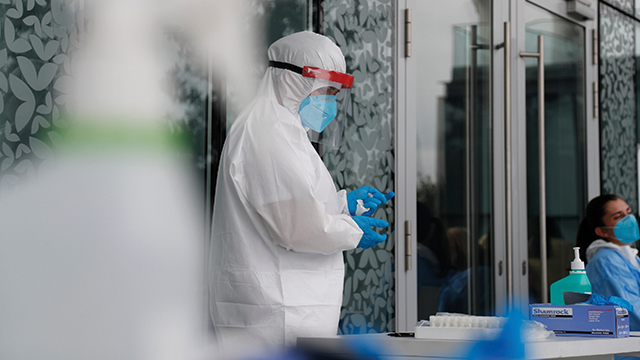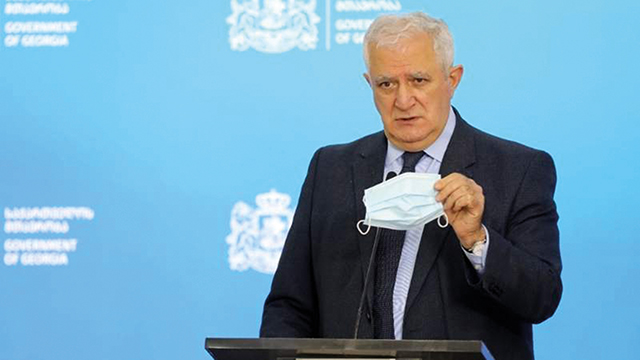Despite the relatively mild symptoms characteristic to the currently dominant Omicron strain, the epidemiological situation in Georgia remains tough and the death toll is still high.
“The epidemiological situation is difficult but under control,” said Amiran Gamkrelidze, Head of the National Center for Disease Control and Public Health (NCDC).
He noted that the country is at the peak of the coronavirus spread, and that it “would overcome the sixth wave with fewer human losses by people following the regulations, avoiding public places and getting booster shots.” He added that 95% of new coronavirus cases were the Omicron strain.
After this week’s meeting of the Interagency Coordination Council, Deputy Health Minister Tamar Gabunia said that the isolation terms for people whose return to work is essential are being reduced from eight to six days for those with no symptoms.
Health officials and authorities say no further Coronavirus restrictions are expected in Georgia, and the same applies to schools and kindergartens, where studies continue in classrooms. “The country is seeing the peak in the Omicron wave. Citizens should not relax despite the Omicron variant proving to be less severe,” they note.
Up to 3000 hospital beds are available in the country. The number of critical patients has not gone up, but labs, outpatient facilities, and online clinics face pressure due to increasing cases.

The Statistics
Georgia reported 24,16 coronavirus cases, 18,221 recoveries, and 54 deaths on Tuesday. Tbilisi recorded the highest number of 11,801 Covid-19 cases, followed by the Imereti region with 3382 cases, and the Adjara region with 2187 cases.
The country reported 25,161 coronavirus cases, 16,789 recoveries, and 51 deaths on Wednesday. Tbilisi recorded 11,857 cases, followed by Imereti with 3730 cases, and Adjara with 2011.
Georgia reported 22,444 coronavirus cases, 13,245 recoveries, and 53 deaths on Thursday.
Tbilisi recorded the highest number of 10,931 new cases within 24 hours, followed by Imereti with 3281 cases, and the Adjara region with 1876 cases.
The daily test-positivity rate now stands at 32.82%, while it was 29.93 % in the past 14 days. Georgia’s total case tally reached 1,398,059, among them 1,154,476 people recovered and 15,404 died.
As of February 10, 2,764,352 people had received a Covid-19 vaccine, averaging 3454 a day.
The Cases Worldwide
Many countries are starting to ease Covid restrictions ahead of the upcoming tourist season.
The UK
All remaining Covid restrictions in England, including the legal rule to self-isolate, could end later this month, Prime Minister Boris Johnson said this week.
Under the current rules, anyone who tests positive must self-isolate for at least five full days.
The current restrictions were due to expire on 24 March, but Mr Johnson told MPs he expected the last domestic rules would end early as long as the positive trends in the data continued, reported the BBC.
In contrast, the Scottish government’s remaining Covid powers are set to be extended until 24 September, as legislation making face coverings mandatory and requiring vaccine passports in some settings was due to expire at the end of the month.
At the same time, the UK has approved a fifth Covid-19 vaccine, developed by US company Novavax, which offers up to 89% protection against Covid illness.
“The Medicines and Healthcare Products Regulatory Agency has said it is safe as a first and second dose in adults. Millions of doses are being manufactured at a plant on Teesside,” reported the BBC.
“Health Secretary Sajid Javid says independent scientists on the Joint Committee on Vaccination and Immunization will now consider its use. The vaccine could then be used immediately as part of the UK vaccination program.”
Europe
School holidays are approaching in much of Europe. In the interests of the tourism industry, travel restrictions are being lifted in some countries.
Unvaccinated people traveling to Portugal will no longer need to submit a negative answer to a Covid test, although restrictions for unvaccinated citizens are still in force.
Vaccinated citizens will not have to submit a test answer in Greece either. However, as in many EU member states, people who have taken two doses of the Covid vaccine 270 days ago should definitely get a booster dose.
And good news for those wishing to go to France – the government has announced that it will soon stop requiring a negative Covid test outside the EU.
However, the restrictions will be lifted only if the number of people infected with the virus continues to decline.
With the spread of the Coronavirus declining, wearing a face mask in public places in Italy will no longer be mandatory.
The situation is the same in Spain, where the government has abolished the obligation to wear a face mask in public places.
The head of the World Health Organization insisted Wednesday that “Covid isn’t finished with us,” appealing for more support to fight the pandemic after his agency reported that case counts and deaths fell worldwide over the past week.
Tedros Adhanom Ghebreyesus, launching a new $23 billion campaign to fund WHO’s efforts to lead a fair rollout of Covid-19 tests, treatments and vaccines around the world, cautioned that “diseases know no borders” and the highly-transmissible Omicron variant has shown that “any feeling of safety can change in a moment,” reported Global News.
WHO’s weekly epidemiological report, released on Tuesday, showed that case counts fell 17% worldwide over the last week, including a 50% decline in the United States, while deaths globally declined 7%.
By Ana Dumbadze














